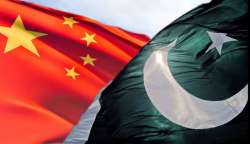In what is seen as a major win for India, China on Monday agreed to include the names of Pakistan-based terror groups in the BRICS declaration. The specific references to Pakistan-based terror groups such as Jaish-e-Mohammed and Lashkar-e-Taiba come as a significant tactical shift by China which has so far objected from the naming of militant outfits.
The shift can be gauged by a comparison of the outcome document that was adopted by the BRICS nations at the summit held in Goa in October 2016. While the Goa document had omitted naming the terror groups, there was a significant change in stand in the Xiamen declaration.
"We support the efforts of the Afghan national defence and security forces in fighting terrorist organisations," the declaration said.
"We, in this regard, express concern on the security situation in the region and violence caused by the Taliban, ISIL/Daesh, al-Qaida and its affiliates, including Eastern Turkistan Islamic Movement, Islamic Movement of Uzbekistan, the Haqqani network, Lashkar-e-Taiba, Jaish-e-Muhammed, TTP and Hizb ut-Tahrir," it said.
The move comes as a mix of embarrassment and a setback for Pakistan, which China terms as its ‘all-weather ally’. Both Jaish and Lashkar work with the tacit support of the Pakistan Army and the ISI. Pakistan had been saved of the embarrassment as China threw its weight behind it. However, with the China summit itself adopting a declaration that names Pakistan-based terror groups, things could go downhill for Pakistan.
Top experts suggest China could now ask Pakistan to crack down on two terror groups, Lashkar-e-Taiba and Jaish-e-Mohammad, named in the BRICS declaration. "From the declaration, you can say there is a visible change in China's stand on this matter," Hu Shishang, director of the Institute of South Asia and South East Asian Studies in Beijing, told TOI.
With India and US already upping the pressure on Pakistan to act against terror, the shift by China will humiliate Islamabad further and virtually push it against a wall. Significantly so as it has been China that has repeatedly blocked India's attempts to get the United Nations to censure Masood Azhar, the head of the Jaish-e-Mohammed terror network that has been named in the BRICS declaration.
For India, there is good reason to see substantive positive development. "For the first time (in a BRICS declaration), there has been specific listing of terror organisations," Preeti Saran, Joint Secretary (East) at the Ministry of External Affairs, told journalists at Xiamen.
Importantly, the naming of terror groups – which has been a longstanding demand by India – paves way for positive talks between Prime Minister Modi and Chinese President Jinping on later today. Indication have been positive from China even otherwise.
Hours after Modi’s touchdown in Xiamen, sources told India TV that China has agreed to keep the Doklam issue out of the ambit of talks between the two leaders. While there is no official word yet on the specific points that the two leaders will discuss, the developments have set a tone for constructive dialogue – something that China’s rhetoric in past months had made difficult to imagine.
Latest India News

